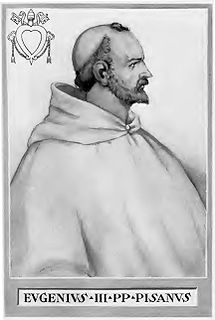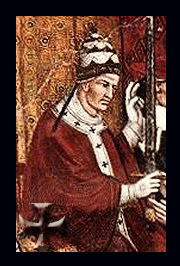 W
WCum universi is a papal bull written by Pope Celestine III, issued on 13 March 1192. The bull ended the claim of the Archbishop of York to metropolitan jurisdiction in Scotland and established an independent national church, albeit one with no figurehead.
 W
WDivina dispensatione is the name for two papal bulls issued by Pope Eugene III. The first was issued on 5 October 1146 to the clergy of Italy, urging Italians to join the Second Crusade. The second was issued on 11 April 1147 at Troyes and called for the Wendish Crusade against the pagan Slavs. In the second bull Eugene declared:Certain of you, however, (are) desirous of participating in so holy a work and reward and plan to go against the Slavs and other pagans living towards the North and to subject them, with the Lord's assistance, to the Christian religion. We give heed to the devotion of these men, and to all those who have not accepted the cross for going to Jerusalem and who have decided to go against the Slavs and to remain in the spirit of devotion on that expedition, as it is prescribed, we grant that same remission of sin...and the same temporal privileges as to the crusaders to Jerusalem.
 W
WLaudabiliter was a bull issued in 1155 by Pope Adrian IV, the only Englishman to have served in that office. Existence of the bull has been disputed by scholars over the centuries; no copy is extant but scholars cite the many references to it as early as the 13th century to support the validity of its existence. The bull purports to grant the right to the Angevin King Henry II of England to invade and govern Ireland and to enforce the Gregorian Reforms on the semi-autonomous Christian Church in Ireland. Richard de Clare ("Strongbow") and the other leaders of the Norman invasion of Ireland (1169–71) claimed that Laudabiliter authorised the invasion. These Cambro-Norman knights were retained by Diarmuid MacMorrough, the deposed King of Leinster, as an ally in his fight with the High King of Ireland, Ruaidrí Ua Conchobair.
 W
WManifestis Probatum is a papal bull dated 23 May 1179, in which Pope Alexander III officially recognised the ruler and self-proclaimed king Afonso Henriques as the first sovereign King of Portugal.
 W
WNon parum animus noster is a papal bull issued by Pope Alexander III on either 11 September 1171 or 1172 to promote the Northern Crusades against the pagan Estonians and Finns. It was addressed to the rulers and peoples of Denmark, Sweden and Norway and begins with a description of the threat posed by the pagan Estonians. Alexander declared:We are deeply distressed and greatly worried when we hear that the savage Estonians and other pagans in those parts rise and fight God's faithful and those who labour for the Christian faith and fight the virtue of the Christian name. ... to gird yourselves, armed with celestial weapons and the strength of Apostolic exhortations, to defend the truth of the Christian faith bravely and to expand the Christian faith forcefully.
 W
WPie postulatio voluntatis is a papal bull issued on 15 February 1113 by Pope Paschal II, in which the Pope formally recognized the establishment of the Knights Hospitaller and confirmed its independence and sovereignty. Today, the document is preserved at the National Library of Malta in Valletta, Malta.
 W
WPost miserabile was a papal bull issued by Pope Innocent III on 15 August 1198 calling for the Fourth Crusade in the Holy Land. More than any other crusading bull, it was not issued in response to any single event, such as setback in the East, but was more organisational in tone, foreshadowing the bureaucratic and administrative changes Innocent would make to the crusading institutions.